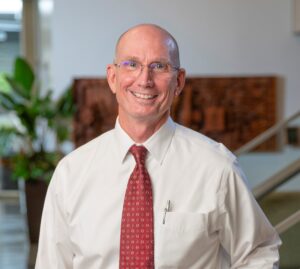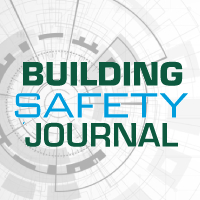
Lance Simms: Upholding the high standards of professionalism in the building safety community

![]() Whether you are new to the construction profession, an experienced tradesperson or an accomplished code professional looking to enhance your knowledge, advance your career or earn certification, you need a variety of education and certification options to help you reach your professional goals. Dedicated to strengthening the credibility of the International Code Council’s certification and education programs, the Professional Development Council (PDC) advises the Board of Directors on coordinated career path resources for Code Council members. The Professional Development Council is comprised of the Education Committee — that provides strategic direction and facilitates the development and delivery of comprehensive code-related courses to help code officials, inspectors and design professionals elevate their qualifications, advance and grow in their profession — and the Certification Committee, which promotes the professionalism of individuals in the built environment by providing professional examinations and certification services worldwide.
Whether you are new to the construction profession, an experienced tradesperson or an accomplished code professional looking to enhance your knowledge, advance your career or earn certification, you need a variety of education and certification options to help you reach your professional goals. Dedicated to strengthening the credibility of the International Code Council’s certification and education programs, the Professional Development Council (PDC) advises the Board of Directors on coordinated career path resources for Code Council members. The Professional Development Council is comprised of the Education Committee — that provides strategic direction and facilitates the development and delivery of comprehensive code-related courses to help code officials, inspectors and design professionals elevate their qualifications, advance and grow in their profession — and the Certification Committee, which promotes the professionalism of individuals in the built environment by providing professional examinations and certification services worldwide.
It takes the time and expertise of many individuals working through the numerous Code Council committees to shape it into the world-class membership association that exists today. Volunteers, one of the most important assets of the Code Council, play a key role in the day-to-day work of the Professional Development Council and are integral to helping develop the certification and education avenues that help building safety professionals to be effective in U.S. and global communities.
In this exclusive feature for the Building Safety Journal, we asked Lance Simms to share his experience serving on the Code Council’s Professional Development Council, his professional career, and any insights or advice he has concerning the industry.
Lance Simms
Senior Lecturer
Texas A&M University
College Station, Texas, United States
International Code Council member for 20 years
How long have you been in the industry?
Thirty-three years.
What was the path to your career — how and why did you pursue a profession in building safety?
My career in building safety started in north Louisiana. I graduated with a degree in building construction in 1984 and, after a short stint in the private sector, decided to pursue employment as a building inspector with the city of Ruston, Louisiana. While I was initially attracted to the predictable working hours and steady employment offered by the public sector, I quickly discovered the value that code professionals provide to a community. We are often referred to as “silent responders” and I believe that is true.
While in Ruston, I was encouraged by my supervisor to pursue certifications. The city was operating under the Standard Building Code at the time, so I started testing and earning certifications through SBCCI. Over the course of a few years, I earned several certifications and was able to advance to the position of building official. I also earned my CBO designation while employed by the city of Ruston.
In 1996, I was blessed with the opportunity to serve as a building official for the city of College Station, Texas, and I eventually retired from the city of College Station as director of Planning and Development Services.
What major changes have you seen?
Two come to mind. The first major change I witnessed was the transition from three regional code groups to one national code organization (ICC). This transition did not happen overnight, but we are better and stronger as a result. The second major change that comes to mind is the focus on energy use and conservation. It may be hard to believe, but I recall a time when energy use and conservation was not part of the code administration discussion. However, we now have a stand-alone code that specifically addresses energy conservation and I am proud to be a part of an organization that is leading the way on this important initiative.
What excites you about the future of your industry?
Since my retirement from the city of College Station, I have been employed by Texas A&M University as a senior lecturer in the Construction Science Department. As such, I have the privilege of interacting with some of the best students around. As a group, these young men and women are the cream of the crop and I am excited to see their impact on the construction industry. Our young professionals are the future leaders in the industry and, from my perspective, we will be in good hands.
What do you see as most surprising about the work that you do?
As an educator in the construction industry, I am most surprised by the rapid rate of technology development. Robotics, 3D printing, wearable technology and augmented reality are just a few examples that come to mind. It will be interesting to see how quickly these advancements in technology are embraced by the industry.
What led you to apply to become a member of the Professional Development Council?
A couple of things. Through the years, I grew to appreciate the service provided by various ICC committees. I also believe in the critical role they fill. Second, ICC has provided me with numerous opportunities for professional growth and development and I was looking for a way to give back to an organization that has been so good to me.
What do you see as your role on the Professional Development Council/Education Committee/Certification Committee?
On a personal level, I believe my role is to be a good listener, respect the views of others, place service above self and devote the time required to complete any assigned duties. On a grander scale, I believe all council and committee members should strive to be good role models and promote professionalism in code administration.
Being a part of the Professional Development Council provides you with an overarching view of the education and certification offerings provided by the Code Council. With that knowledge, what would you recommend to individuals who are entering the industry?
My recommendation to anyone just entering the industry is to take full advantage of all the educational and certification opportunities provided by the ICC. The PDC works hard to develop and provide quality educational material in a variety of forms and certification testing options have been recently expanded. Pursuing educational opportunities and earning ICC certifications is a powerful way to demonstrate your competence as a code professional.
What has been your most satisfying accomplishment with your work on the Professional Development Council?
One of the most important responsibilities of the Certification Committee is the selection and appointment of individuals to serve on Examination Development Committees. This task also tends to be the most satisfying because I get to see firsthand the quality of applicants while ensuring our certification exams are being developed and maintained by dedicated professionals.
And finally, this last question is a fun one we ask for our Building Safety Journal readers. If you could have any superhero power, what power would you have and why?
Super strength! I would love to be known as Mr. Incredible!
Thank you for your work on the Professional Development Council. Your dedication to strengthening the Code Council’s certification and education programs is impressive and we appreciate your commitment to upholding the high standards of professionalism in the building safety community.
About the Professional Development Council
The Professional Development Council recommends initiatives identified by the Education Committee and the Certification Committee to better serve the needs of the membership, coordinates the goals and objectives of the Education Committee and the Certification Committee, and identifies certification and education issues arising from Code Council policies that will improve or enhance the position of the association.
The Education Committee is committed to providing strategic direction and facilitating the development and delivery of the most comprehensive portfolio of code-related courses available to meet the needs of code officials, inspectors and design professionals to elevate their qualifications as well as help them advance and grow in their profession. The Education Committee is responsible for advising Code Council staff and the Board of Directors on matters related to the ICC Education Program and the Learning Center, reviewing and selecting the topics and presenters for the annual business meeting, providing a review and recommendation for the Educator of the Year award, serving as a resource for review of potential learning initiatives and curriculums within the Learning Center, providing new topics and concepts for learning initiatives within the Learning Center, promoting and encouraging members to take advantage of the training offered by the Learning Center, and relaying information provided by the membership to staff in order to improve programs.
“The insight and guidance the Education Committee provides the Code Council is beyond measure,” said Tracy Lendi, vice president of Training & Education for the International Code Council. “While not only offering a myriad of educational ideas, the committee offers a safe place to discuss and debate these ideas so we can provide comprehensive and effective training solutions to the building industry. Being a part of the Educational Committee is truly my honor and privilege.”
The Certification Committee is dedicated to promoting the professionalism of individuals in the built environment by providing professional examinations and certification services worldwide. It has sole authority over the rules and procedures of the ICC Certification Program, including such topics as the renewals process, examination security policies and disciplinary action. The Certification Committee is responsible for advising Code Council staff and the Board of Directors on all matters related to the Certification Program, maintaining the International Registry of current ICC Certified professionals, supporting international recognition of ICC Certifications, direction and oversight of the Examination Development Committees, and serving as a disciplinary board.
“It is a privilege to work with the members of the Certification Committee,” said Autumn Saylor, director of the International Code Council’s Assessment Center. “The Code Council appreciates the committee’s commitment to upholding the high standards of professionalism in the building safety community.”
From an array of training options for every individual to the ICC Assessment Center, the Career Center, the signature Safety 2.0 initiative, or its Scholarship Program, the Code Council is committed to supporting the education and certification of existing and future code officials.








